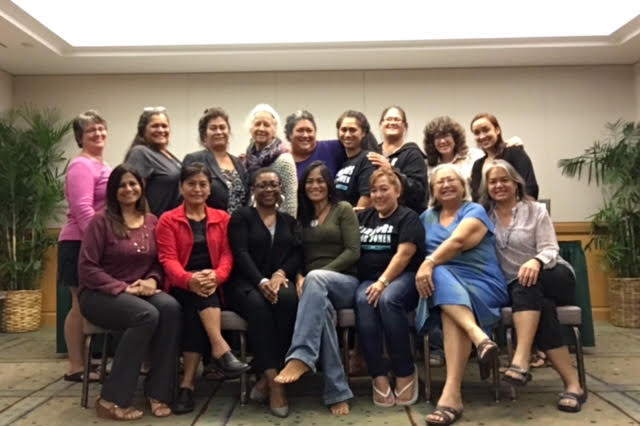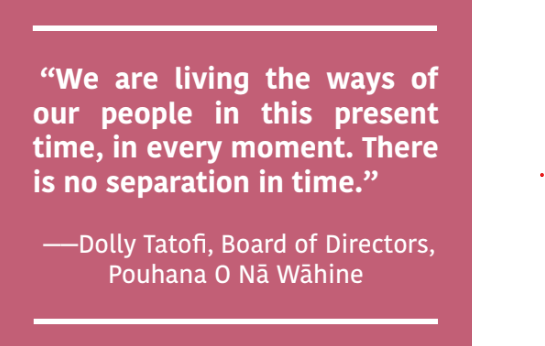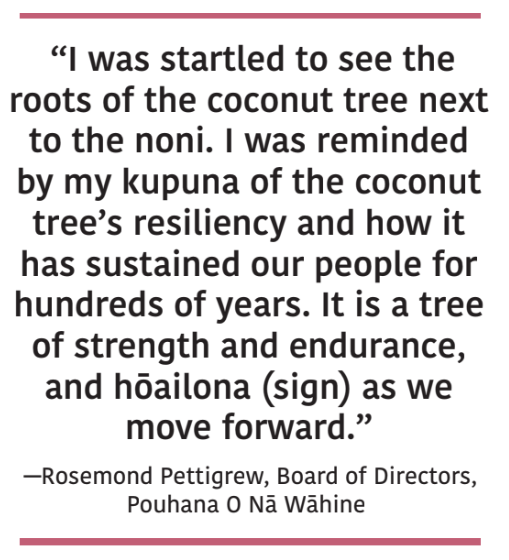Pouhana O Nā Wāhine Awarded and Honored To Serve as the Native Hawaiian Resource Center On Domestic Violence

Living Aloha
Paula
The Pouhana O Nā Wāhine (PONW) celebrates the news they received on September 27, 2022, that PONW has been awarded to serve as the Native Hawaiian Resource Center on Domestic Violence (NHRCDV) to reduce domestic violence disparities facing Native Hawaiians. The award is administered by the Family Youth and Services Bureau, U.S. Department of Health and Human Services. Thanks to the late Senators Akaka and Inouye’s leadership, the NHRCDV was authorized in the Family Violence Prevention and Services Act (FVPSA) 2010, but never funded until this year. The PONW was formed to fulfill the kuleana (responsibilities) of the NHRCDV. PONW will open its doors this fall. This funding is reflective of a sea of changes increasing Native Hawaiian women’s safety.
PONW is committed to enhancing the capacity of its stakeholders to respond to domestic violence in a culturally relevant manner—Native Hawaiian (NH) communities, domestic violence programs, state and federal governments, policymakers, and others. PONW is dedicated to restoring NH beliefs and ceremonies and helping increase survivors’ safety through technical assistance and training (TA/T), partnering at the community, state, and national levels, and developing policies and resources. While domestic violence programs function in Hawaiʻi, none serve as resource centers that are designed, led, and managed by NHs or rooted in NH solutions like PONW that contribute to the fulfillment of the federal trust responsibility to assist NHs in safeguarding women’s lives. NIWRC and PONW have partnered since 2013 to address the needs of NHs that experience domestic violence, including the realization of the creation of an NHRCDV.
The history of the U.S. conspiring, the overthrow of the NH government, and the taking of NH homelands is reflected in the rates of violence against NH women. An NHRCDV will organize, amplify, and connect survivors’ voices to restore protections rooted in NH culture. This process takes aloha and this was reflected in NIWRC’s meeting with the PONW this past July. This mo’olelo (story) and lived experience is guided by aloha as the foundation of the NH groundswell joining with the tribal and national groundswell to restore respect for women in thought, actions, social norms, and state and federal laws and policies.
Dolly
Our meeting was on the windward side of Oahu at the Windward Retreat Center. A quiet place next to the mauna (mountain). Over the past seven years, our hui (group) had decreased in size from approximately thirty people to four, each year organizing more. As more kuleana (responsibility) was absorbed, challenges came forward making the hana (work) difficult to accomplish. This retreat center is close to the elements, flora, fauna, and ʻuhane (spirit) of this ʻāina (land). This ground allowed for a leveling out of space and place to be ready to share with honesty what has held us back from our hana.
We started the retreat with greetings of aloha. I facilitated a Hanu and Hā (breathing exercise) to help wāhine ground before getting into this heavy and meaningful hana. After this exercise, through some kukakuka (intentional conversation), concepts emerged, including Noho pono (to sit, reside; in this instance to be present in a just way) that set the foundation for hoʻoponopono (conflict resolution and forgiveness) and receiving hōʻailona (spiritual messages).
It showed the power of being pono (correct, balanced) in life. As we went into a space of aloha, hoʻoponopono organically unfolded and we cleared the way for the most mana-ful (powerful) work to come forward. We were able to see, feel, and know how being Kanaka ʻŌiwi is not something we refer to in the past, but rather that the ʻike (knowledge), traditions, and the ways of doing things happen i keia manawa, in the moment. We are living the ways of our people in this present time, in every moment. There is no separation in time. This was clear as we talked about Noho to be in a space where we take that time to build our relationships and be pono in ourselves and with others.
 Another profound moʻolelo was discussing the transformation of our logo to reflect what pouhana means. Coming to the realization that our Akua Wāhine (goddesses) are alive and born just like our Akua Wahine ʻO Pouhana. She is the essence of what Nā Wāhine o Hawaiʻi need to re-member, that we are as strong as the pillar of a hale (house), even more so a kauhale (village). This needs to be restored so that our wāhine know the strength that they have within that cares for many.
Another profound moʻolelo was discussing the transformation of our logo to reflect what pouhana means. Coming to the realization that our Akua Wāhine (goddesses) are alive and born just like our Akua Wahine ʻO Pouhana. She is the essence of what Nā Wāhine o Hawaiʻi need to re-member, that we are as strong as the pillar of a hale (house), even more so a kauhale (village). This needs to be restored so that our wāhine know the strength that they have within that cares for many.
As we discussed the challenges that we have each dealt with, we clarified assumptions, released withholds between us through forgiveness, felt closer, and received divine inspiration and messages. We felt lighter and clearer to see the hana ahead. The element of ʻāina and this space allowed for healing. We expressed our gratitude for this space and place in pule (prayer) and by offering a makana aloha (loving gift) to the ʻāina. What came full circle was the important reminder (by the ʻāina) of forgiveness and as we ended in a way in which we should have started. Forgiveness is the key to restoring relationships through aloha in our lives always and in all ways. Our worldview as kanaka ʻōiwi (Native Hawaiian) and the relationships between kanaka (people), ʻāina, the kai (ocean), the elements, and the unseen which include nā Akua (the Gods) and ʻaumākua (spiritual ancestors) have always been in a state of lōkahi (completeness) and was never broken on the deepest level. The ʻāina reminded us of this.
Aunty NaniFay
The surrounding environment affected us all. Face-to-face was healing. We could see and feel the many emotions shared and felt between us. The space was quiet as we were surrounded by the natural elements. We could hear and see the makani (wind) blowing and hear the ocean in the background. We were embraced from mauka to makai (mountainside to oceanside). What a wonderful experience for me. The hoʻoponopono and breathing was a great way to release negative feelings and be open and transparent. We continued at our own pace, slowly so as not to judge ourselves and others. Our views of the Universe are crucial because we will be working in different communities. Our different ways will help to have a wider perspective of the communities here in Hawaiʻi and of other Indigenous peoples around the world.
A big thank you to our House and Senate Appropriations Committees in Washington, D.C. for their support for an NHRCDV and to our many supporters and partners in Hawaiʻi and across the country, especially the National Indigenous Women’s Resource Center who has been a committed relative to Native Hawaiians and the PONW since 2011. NIWRC has been ‘onipa‘a (resolute, steadfast) in their partnership with the PONW and Native Hawaiians.
Dayna
Photo courtesy of Lary Ganiron, Lifted Creative Studio.
I had concerns leading up to our meeting as I was aware of our need for hoʻoponopono. The need for transparency, however, I was not sure how genuine and transparent everyone would be, along with being receptive and open to feedback. I felt relief regarding having an open and honest conversation, releasing things I have held for seven years on words communicated to me at the inception of our coordination meetings with NIWRC in 2015. My hope moving forward is to have continued transparency and humility while allowing growth and correction with aloha. Accepting similarities and respecting differences is key as I welcome diversity and support equity amongst all.
Hearing Paula identify the strength in PONW to be able to resolve conflict better and more effectively than other agencies she has been a part of and participated in was uplifting. While we had and will have differences, the ability to talk through varying perspectives is a skill set that takes time, effort, respect, and genuine care for one another as we all strive for the best possible outcome. I feel this walked us right into Noho Pono, our newest concept introduced by Dolly which has since resonated within me deeply. Furthermore, being surrounded by the elements of our ʻāina, enriched the process and allowed for things to organically unfold. Trusting in the space, company, and ourselves is not easy, yet a priceless gift we all have. I truly believe we are being guided by our ancestors and Akua to do this work and we will continue to holomua (move forward) while being onipaʻa.
Lastly, this was an eye-opening and tear-shedding moment, as the opportunity has come for the opening of the Native Hawaiian Resource Center on Domestic Violence for which we have advocated for. Our time is now, to be the change of our people, fellow survivors, and lost loved ones. What an honor!
Loke
PONW and NIWRC had the privilege of meeting in the beautiful moku (land division) of Kaʻaʻawa to discuss the purpose of an NHRCDV and future projects. It was a peaceful setting. I listened to the mana (power) of the ocean that created a space for my mind, body, and spirit to connect with the elements and the roots of my kupuna (ancestors).
At dawn on the first day, I went outside to say a pule (prayer) and sprinkle paʻakai alaea (sea salt and dirt with minerals) on the ʻāina at the base of the center’s entrance. I do this to cleanse and purify around my hale (house), remove negativity, restore pono (make right) and balance, and keep unwanted ʻuhane (spirits) from coming into the space.
We started with a Hanu and Hā (deep breathing exercise), an essential protocol for grounding. It sets the tone of peace as you prepare for hoʻoponopono. I asked Akua and my kupuna to guide my ʻuhane. I knew I would be vulnerable, yet, I felt safe, peaceful, and emotional as I shared personal situations aside from my role as a board member. I realized when the question was asked if having a haku (an unbiased mediator, one that is respected by all) would have affected the outcome, I believe the result would have been different for me. In other situations, a haku may be necessary, but fortunately, we shared without hesitation. I felt my mana and ʻuhane release me from the pilikia (trouble) and lift the kaumaha (heavy weight) I had felt.
Before closing that portion of our meeting, we each put paʻakai alaea in the middle of a ti leaf (ti is used in ceremonies as protection against bad spirits and to bring in good) and we wrapped it into a puolu (bundle). We went outside to pule (pray). Each of us put our puolu into one ti leaf and I placed it at the base of a noni tree, an Indigenous medicine tree, and a coconut tree. I was startled to see the roots of the coconut tree next to the noni. I was reminded by my kupuna of the coconut tree’s resiliency and how it has sustained our people for hundreds of years. It is a tree of strength and endurance, and hōʻailona (sign) as we move forward.
PONW intends to create healing spaces for nā keiki o keia ʻāina (the children of this land), Native Hawaiians, by providing TA/T, aloha as a protective factor, and our worldview that is intertwined into all Hawaiians. Hawaiians must reconnect to their identity spiritually, to know where they come from, and how we belong to this land. Hawaiʻi is our home and with the shift from a traditional lifestyle to an unfamiliar way of life due to colonization that created a disconnect. This affected the life of our kupuna and is evident in the violence against our Kānaka wāhine (NH women and girls).
Mahalo nui, I am grateful to NIWRC, AKNWRC, and PONW to work with wāhine who are strong and care about healing our generations of Kānaka (Native people). Healing is imperative to our Lāhui’s (Hawaiian nation) survival. The ʻike (knowledge) and naʻauao (wisdom) PONW shares are phenomenal with 100 years of experience as survivors, advocates, and social workers. Me ka haʻahaʻa (humility).





